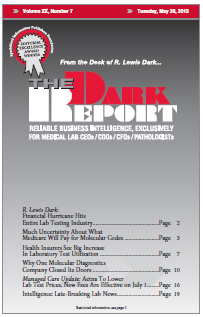CEO SUMMARY: In a recent public workshop, managed care executives revealed that the annual cost of outpatient laboratory testing is increasing at twice the rate of all other medical services. One big driver in the increased spending on lab testing is increased utilization of lab tests by physicians—particularly expensive molecular diagnostic assays and genetic tests. …
Health Insurers See Big Increase in Lab Utilization Read More »
To access this post, you must purchase The Dark Report.


